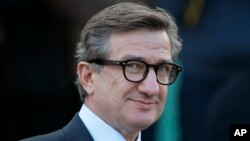VOA's Henry Ridgwell interviewed the governor of Ukraine's embattled Donetsk region, Serhiy Taruta. Tarutra has moved his whole office to Mariupol.
Q: What is the current security situation in the Donetsk region?
Unfortunately, a real truce has not been accomplished. Of course the level of casualties that we had before has declined, the conflict is not active. But the ceasefire is being exploited to attack our checkpoints and military positions all the time, especially at Donetsk airport. As we know really advanced missiles have been used there, the whole Kalinin district has been shuddering under the artillery, and lots of our boys have been killed.
The area of Debaltsevo is being shelled every day. But the most tragic thing is that while blaming the Ukrainian army, they are shelling residential areas of Donetsk city, like Makiivka, and we have civilians among the casualties. This morning a shell has hit the schoolyard, lots of people were killed, and thank God there were no children among them. Another shell also has hit a minibus. And the separatists are doing this and trying to blame it on the Ukrainian army, accusing them of genocide.
Q: Who is breaking the ceasefire?
There is no Ukrainian army in that district [Donbas]. The Ukrainian army is observing the truce. I have meetings every day with the «M» sector commander who is responsible for Mariupol defense and coordination. They have an order from the chief commander not to use weapons, unless they are attacked; then they can respond. They never even once violated those agreements signed between the Presidents [of Ukraine and Russia]. Unfortunately it’s not working out right now to the extent that everyone had hoped after the signing of the Minsk agreements.
Q: What is the situation like for residents in the rebel-held areas?
There is communication and coordination with almost every town in the Donetsk region, despite the fact that our law enforcement authorities are not controlling these areas. Nevertheless, municipal authorities are working in towns including Donetsk and Makeyevka; all the utility and transport services are working.
We are trying to repair or restore those damaged buildings as soon as possible. Hospitals are working. Even one bank is working and providing cash. Stores are open. We are trying to provide services as best we can. There are Ukrainians living there and our mission is to help every one of them, despite that fact they are under temporary occupation.
Q: Will President Poroshenko’s plan of giving the Donetsk and Luhansk regions more autonomy not simply play into the hands of Russia?
I don’t see that as a threat, so long as the conditions of closed borders and strict control of people and military equipment are met. If we control the border, then greater autonomy would create greater possibilities for regional development - not just for Donbas, but also for every region including western and central parts of Ukraine. And that should be done.
Q: What is the economic situation in the Donetsk region and how will it impact on Ukraine’s economy as a whole?
Unfortunately the economic situation is really sad. Today the companies in the occupied areas are almost all not working, everything has been stopped - coal mines, metal factories, coke plants, machine engineering. And as a result the export of our products has fallen by 50 percent. Before the crisis, the Donetsk region had been exporting $1.5 billion a month. Now this figure is halved.
That’s why we have a problem with the foreign exchange balance; we have a problem with tax revenue that’s needed to pay off all the obligations of the Donetsk region.
The situation in the Luhansk region is even worse. These are new challenges for our government. Of course we need help but this help should be provided only alongside reforms in the country. And here I absolutely agree with the demands of all the international financial institutions that want to help Ukraine. They also should insist on these transformations. Reforms will only make us stronger against the disaster we have now. This is a time when society is consolidating around one desire - to change the authorities, to conduct reforms and re-start the economy fast.




